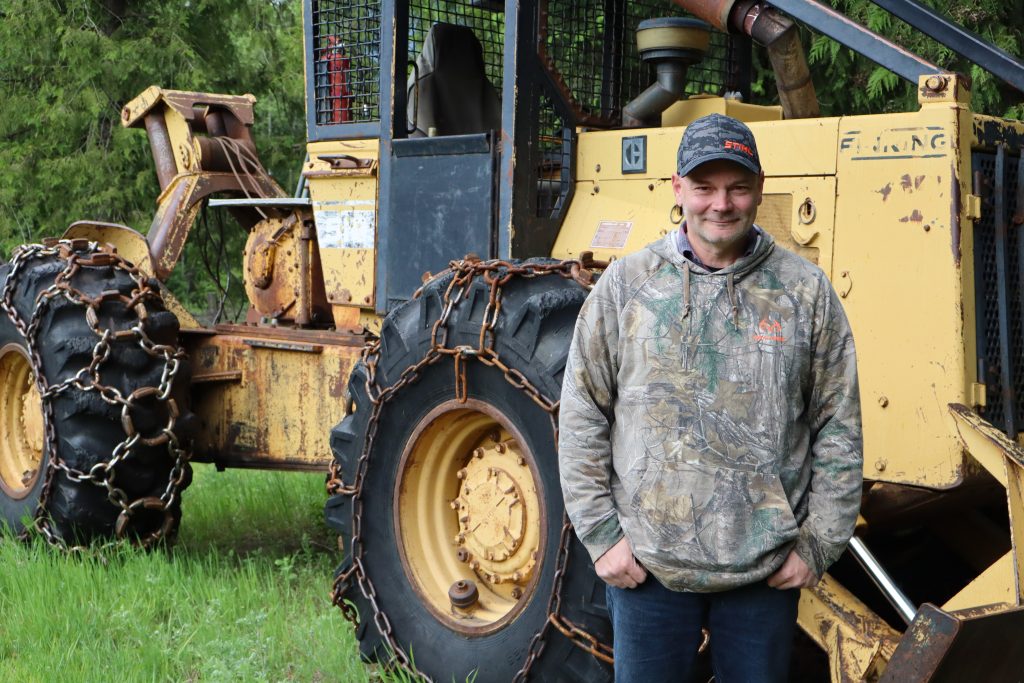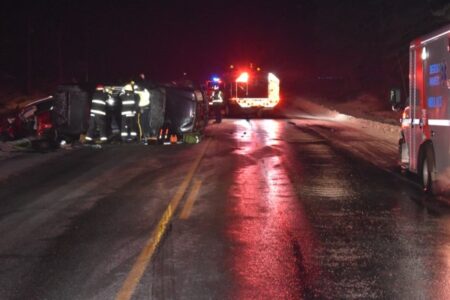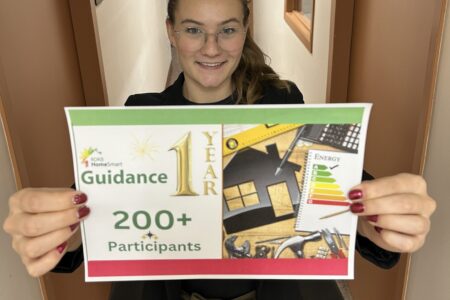Pass Creek logger wants better forestry: a Living Here Magazine feature
By Anna Dulisse
As a logger and third-generation caretaker for his acreage near Castlegar, Quintin Sperling has carried on the legacy of working hard, by spending his life in the forests both on and off his family’s land.
“I’m a certified faller and in B.C. I’ve done practically everything related to timber harvesting, logging, road building, firefighting, and silviculture work,” Quintin says. “We also manage our own timber and selectively log off our property.”
But recently, Quintin decided to stop working in the woods. It’s a profession he no longer feels proud to be a part of.
“I don’t work in the forest industry anymore,” Quintin says. “I’ve been out of it for about two years because I’m sick and disappointed with it.”
“I’m a certified faller and in B.C. I’ve done practically everything related to timber harvesting.”
WHEN BEING RESPONSIBLE IS OPTIONAL
Growing up on a farm surrounded by mountains and trees and wildlife is what drew Quintin to forestry in the first place.
“I’ve been an avid hunter since I could walk,” Quintin says. “You’re aware of what’s going on around you, your surroundings, you’re part of the land. You have to be.”
Quintin has a strong connection to nature and cares about the health and future of the forests he has spent his life in. But after years of being in the bush, he is tired of seeing users disrespect the forests.
Recently, he has repeatedly seen slash piles and industrial waste left behind by private contractors, publicly owned logs stolen, and sensitive watersheds damaged.
Quintin is well-connected in the forest industry, and when he talks to friends and acquaintances, they confirm that what he has seen over the years is not an isolated incident happening only in his backyard.
“We’re supposed to own [these forests]. This is our resource,” Quintin says. “But this is the way forestry is done in all of B.C.”
Quintin has documented the violations he’s seen in the forests near him and submitted evidence to local compliance officers. However, the timber license holders are allowed to continue their work with no repercussions that he’s aware of. This makes him angry.
“There’s no excuse for these guys not to do what they’re mandated to do, and it seems that nobody’s holding them to account,” Quintin says. “This is what I’ve seen.”
“We’re supposed to own these forests. This is our resource.”
THE FORESTS BELONG TO US
Quintin supports logging in B.C. It has put food on his table. He enjoys the work and supports the industry continuing to employ people now and into the future.
“I’m not anti-logging. I’m a conservationist, and I know that logging is a tool, and you have to look after [the forests] like a garden,” Quintin says.
But he wishes decision-makers treated public forests like property owners treat the land they live on.
“A lot of timber tenure holders have lost their privilege to be in the forest,” Quintin says. “They’re going to continue to deplete the resource, it’s going to run out, and they’re going to leave a bunch of liability. For future generations, there’s nothing left for them. It saddens me.”
When it comes to changing the way the Province manages its natural resources, Quintin is not convinced the BC government has the interests of residents like him in mind.
“I hear the [BC] government and industry lying to people. The public believes they have the best intentions and are looking after our environment and our forest. But I know what’s happening. I see it.”
Quintin thinks various governments have let corporations and industry have control over and even abuse the forests that they are responsible for and that British Columbians own (approximately 95% of the province’s timber supply is publicly owned).
“If local communities could manage the resource themselves, then the value stays in the community,” Quintin says.
In Quintin’s experience, the industry used to behave better, and when it didn’t, governments held it accountable. This meant workers like him felt pride working in an industry that was strongly regulated and responsibly managed.
“When I started out, there was maybe the odd, bad actor,” Quintin says. “Now [logging companies] just leave a bunch of debt and liability and damage to the forest and the environment and everything and walk away. It’s gotten worse and worse. This is the level of respect they have for us and our resources.”
Quintin wants logging in B.C. to be managed differently. This is why he supports a new proposed provincial framework, the biodiversity and ecosystem health law, that, if adopted and enforced, could improve how natural resources are managed in the province.
“Put the resource in the hands of the people that are going to be affected by it and innovative companies that realize the true value of the log is what they produce with it,” Quintin says. “Then good companies are going to form partnerships with timber holders, private community forests, or First Nations, and we’re going to have a reliable, sustainably logged fibre source.”
“Put the resource in the hands of the people that realize the true value of the log.”
FOR FUTURE FORESTS AND GENERATIONS
Quintin is a self-described realist, but he still hopes a better way is possible.
“I think if the government had the courage, all they’d have to do is rewrite and pass new legislation… [and] say ‘if you’re not operating ethically and sustainably, we will pull your timber license, you get no compensation for it, you have no legal recourse.’”
Quintin admits that if they did this, the future for forestry in B.C. could be positive, and he might go back to work in an industry he can feel proud being a part of again.
While he’s made complaints over the years, Quintin has been reluctant to speak out publicly. He has friends and family who work in the forest industry today. But today he’s ready to share his opinions and he wants people like him to feel like they can do the same.
“There can be a sustainable forest industry that will keep communities and people with a livelihood and a resource and an environment,” Quintin says. “But it’s going to take people like you and your children to stand up and say, ‘enough is enough, quit destroying our future.’ People are going to have to stand up for their rights. That’s what it’s going to take.”






















Comments